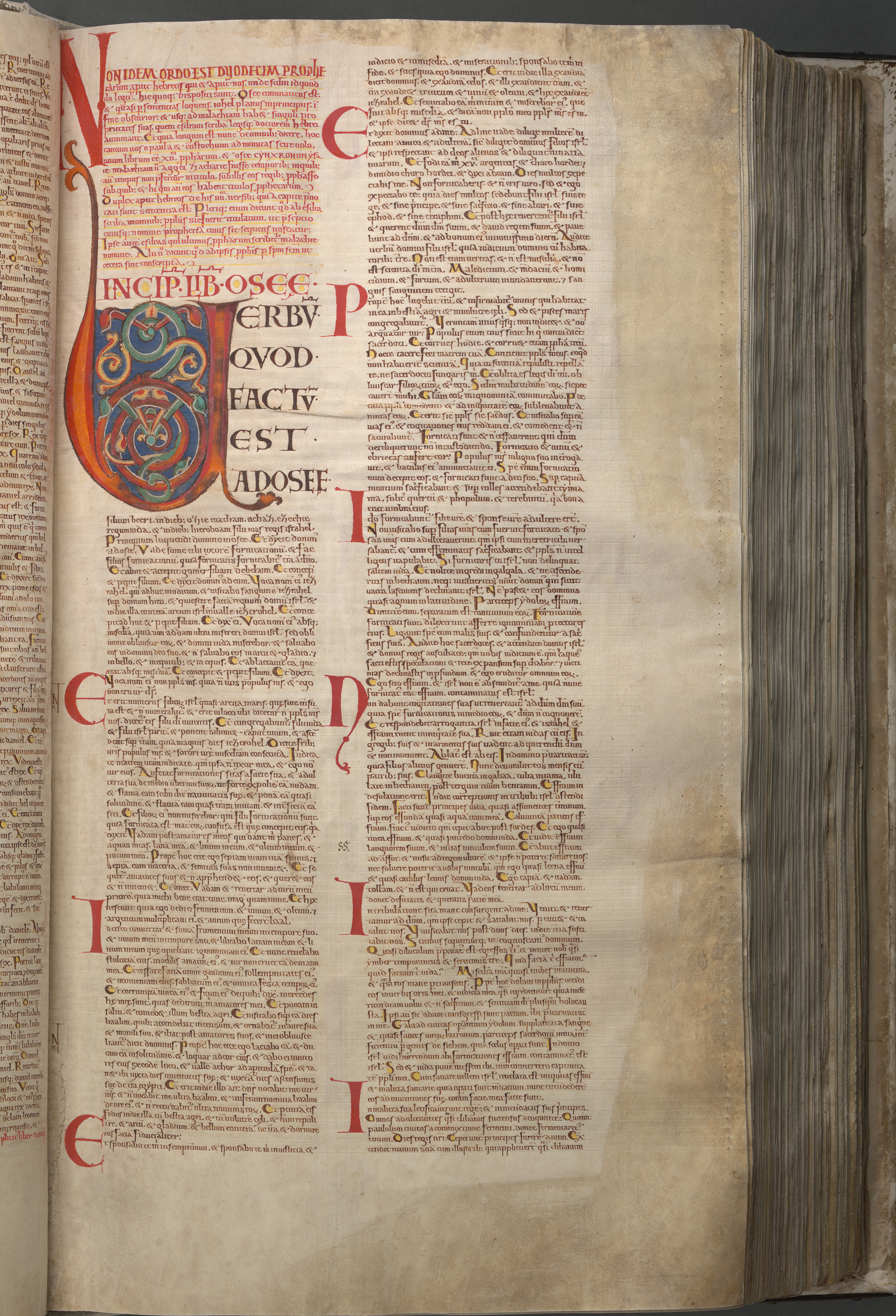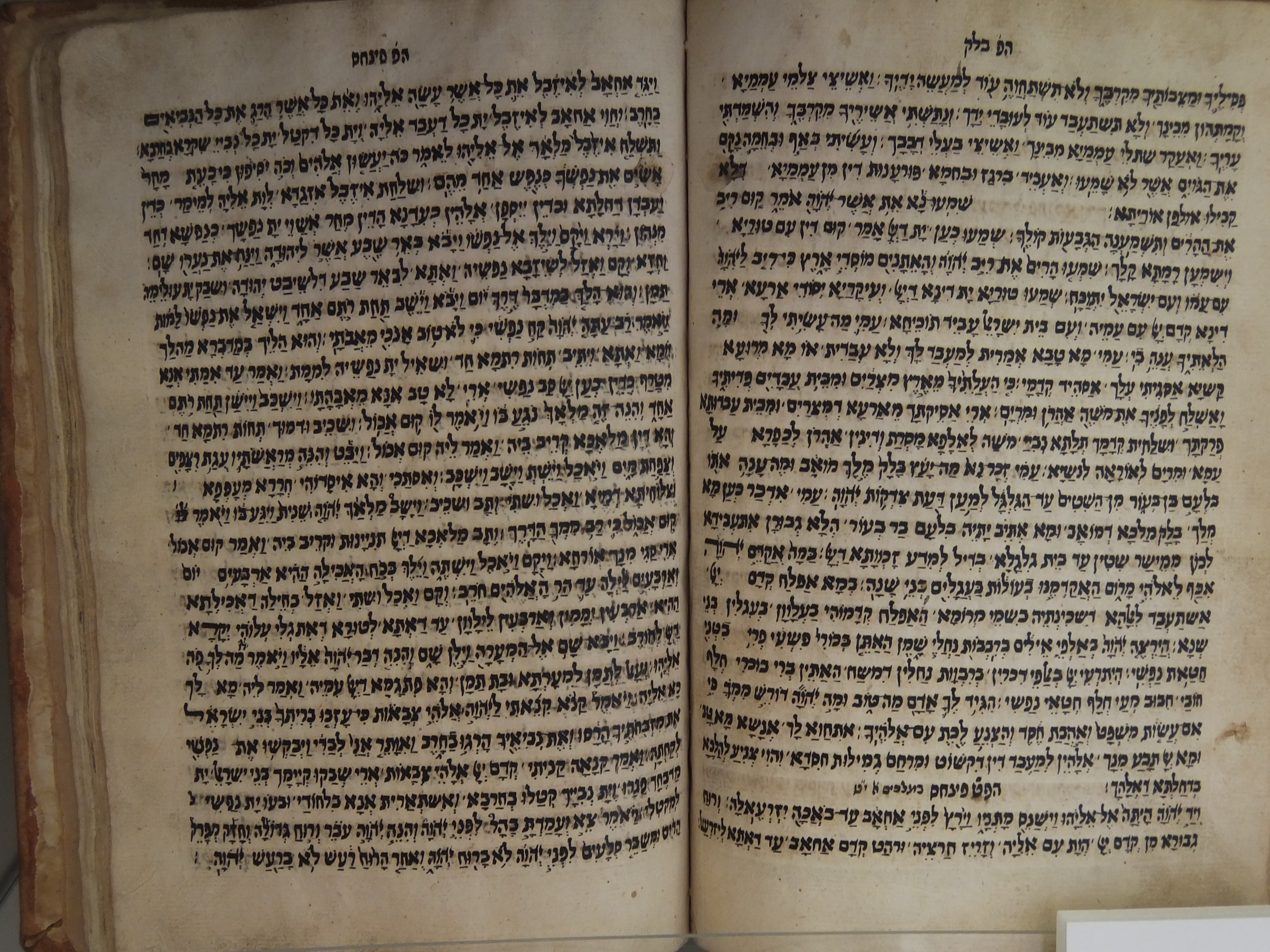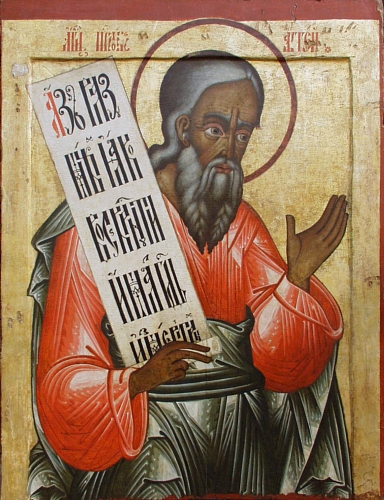|
Neviim
The (; ) is the second major division of the Hebrew Bible (the ''Tanakh''), lying between the () and (). The Nevi'im are divided into two groups. The Former Prophets ( ) consists of the narrative books of Joshua, Judges, Samuel and Kings; while the Latter Prophets ( ) include the books of Isaiah, Jeremiah, Ezekiel, and the Twelve Minor Prophets. Synopsis The Jewish tradition counts eight books in ''Nevi'im'' out of twenty-four books in the Hebrew Bible. There are four books of the Former Prophets, including Joshua and Judges, and the collected ''Books of Samuel'' and ''Books of Kings'' are each counted as one book. Among the four books of the Latter Prophets, Isaiah, Jeremiah, and Ezekiel account for three books, followed by the "Twelve" (: Hosea, Joel, Amos, Obadiah, Jonah, Micah, Nahum, Habakkuk, Zephaniah, Haggai, Zechariah, and Malachi), which is counted as a single book. The development of the Hebrew Bible canon placed the Book of Daniel as part of the "Writings, ... [...More Info...] [...Related Items...] OR: [Wikipedia] [Google] [Baidu] |
Twelve Minor Prophets
The Twelve Minor Prophets (, ''Shneim Asar''; , ''Trei Asar'', "Twelve"; , "the Twelve Prophets"; , "the Twelve Prophets"), or the Book of the Twelve, is a collection of twelve prophetic works traditionally attributed to individual prophets, likely compiled into a single anthology by the Persian period. It contains diverse literary forms and themes. Scholarly debate continues over the dating and editorial history of these texts. In the Tanakh, they appear as a single book, "The Twelve", which is the last book of the ''Nevi'im'', the second of three major divisions of the Tanakh. In the Christian Old Testament, the collection appears as twelve individual books, one for each of the prophets: the Book of Hosea, Joel, Amos, Obadiah, Jonah, Micah, Nahum, Habakkuk, Zephaniah, Haggai, Zechariah, and Malachi. Their order, and position in the Old Testament, varies slightly between the Protestant, Catholic and Eastern Orthodox Bibles. The name "Minor Prophets" goes back to August ... [...More Info...] [...Related Items...] OR: [Wikipedia] [Google] [Baidu] |
Ketuvim
The (; ) is the third and final section of the Hebrew Bible, after the ("instruction") and the "Prophets". In English translations of the Hebrew Bible, this section is usually titled "Writings" or "Hagiographa". In the Ketuvim, 1–2 Books of Chronicles, Chronicles form one book as do Book of Ezra, Ezra and Book of Nehemiah, Nehemiah which form a single unit entitled Ezra–Nehemiah. (In citations by chapter and verse, however, the Hebrew equivalents of "Nehemiah", "I Chronicles" and "II Chronicles" are used, as the Chapters and verses of the Bible, system of chapter division was imported from Christian usage.) Collectively, eleven books are included in the Ketuvim. Groups of books ''Sifrei Emet'' In Masoretic manuscripts (and some printed editions), Psalms, Book of Proverbs, Proverbs and Book of Job, Job are presented in a special two-column form emphasizing the parallel wikt:stich#English, stichs in the verses, which are a function of their Biblical poetry, poetry. Coll ... [...More Info...] [...Related Items...] OR: [Wikipedia] [Google] [Baidu] |
Moses
In Abrahamic religions, Moses was the Hebrews, Hebrew prophet who led the Israelites out of slavery in the The Exodus, Exodus from ancient Egypt, Egypt. He is considered the most important Prophets in Judaism, prophet in Judaism and Samaritanism, and one of the most important prophets in Christianity, Prophets and messengers in Islam, Islam, the Manifestation of God (Baháʼí Faith)#Known messengers, Baháʼí Faith, and Table of prophets of Abrahamic religions, other Abrahamic religions. According to both the Bible and the Quran, God in Abrahamic religions, God dictated the Mosaic Law to Moses, which he Mosaic authorship, wrote down in the five books of the Torah. According to the Book of Exodus, Moses was born in a period when his people, the Israelites, who were an slavery, enslaved minority, were increasing in population; consequently, the Pharaohs in the Bible#In the Book of Exodus, Egyptian Pharaoh was worried that they might ally themselves with New Kingdom of Egypt, Eg ... [...More Info...] [...Related Items...] OR: [Wikipedia] [Google] [Baidu] |
Haftara
The ''haftara'' or (in Ashkenazi Jews, Ashkenazic pronunciation) ''haftorah'' (alt. ''haftarah, haphtara'', ) "parting," "taking leave" (plural form: ''haftarot'' or ''haftoros''), is a series of selections from the books of ''Nevi'im'' ("Prophets") of the Hebrew Bible (''Tanakh'') that is publicly read in synagogue as part of Judaism, Jewish religious practice. The ''haftara'' reading follows the Torah reading on each Shabbat, Sabbath and on Jewish holidays, Jewish festivals and ta'anit, fast days. Typically, the ''haftara'' is thematically linked to the ''parashah'' (weekly Torah portion) that precedes it. The ''haftara'' is sung in a chant. (Chanting of Biblical texts is known as "ta'amim" in Hebrew, "''trope''" in Yiddish, or "Hebrew cantillation, cantillation" in English.) Related blessings precede and follow the haftara reading. The origin of haftara reading is lost to history, and several theories have been proposed to explain its role in Jewish practice, suggesting ... [...More Info...] [...Related Items...] OR: [Wikipedia] [Google] [Baidu] |
Book Of Jeremiah
The Book of Jeremiah () is the second of the Latter Prophets in the Hebrew Bible, and the second of the Prophets in the Christian Old Testament. The superscription at chapter Jeremiah 1#Superscription, Jeremiah 1:1–3 identifies the book as "the words of Jeremiah son of Hilkiah". Of all the prophets, Jeremiah comes through most clearly as a person, ruminating to his scribe Baruch ben Neriah, Baruch about his role as a servant of God with little good news for his audience. His book is intended as a message to the Jews in exile in Babylon, explaining the disaster of exile as God's response to Israel's pagan worship: the people, says Jeremiah, are like an unfaithful wife and rebellious children, their infidelity and rebelliousness made judgment inevitable, although restoration and a new covenant are foreshadowed. Authentic oracles of Jeremiah are probably to be found in the poetic sections of Jeremiah 1, chapters 1 through Jeremiah 25, 25, but the book as a whole has been heavily ... [...More Info...] [...Related Items...] OR: [Wikipedia] [Google] [Baidu] |
Random House Webster's Unabridged Dictionary
''Random House Webster's Unabridged Dictionary'' is a large American dictionary, first published in 1966 as ''The Random House Dictionary of the English Language: The Unabridged Edition''. Edited by Editor-in-chief Jess Stein, it contained 315,000 entries in 2256 pages, as well as 2400 illustrations. The CD-ROM version in 1994 also included 120,000 spoken pronunciations. History The Random House publishing company entered the reference book market after World War II. They acquired rights to the ''Century Dictionary'' and the ''Dictionary of American English'', both out of print. Their first dictionary was Clarence Barnhart's ''American College Dictionary'', published in 1947, and based primarily on ''The New Century Dictionary'', an abridgment of the ''Century''. In the late 1950s, it was decided to publish an expansion of the ''American College Dictionary'', which had been modestly updated with each reprinting since its publication. Under editors Jess Stein and Laurence Urdan ... [...More Info...] [...Related Items...] OR: [Wikipedia] [Google] [Baidu] |
Jewish Holidays
Jewish holidays, also known as Jewish festivals or ''Yamim Tovim'' (, or singular , in transliterated Hebrew []), are holidays observed by Jews throughout the Hebrew calendar.This article focuses on practices of mainstream Rabbinic Judaism. Karaite Judaism#The calendar, Karaite Jews and Samaritans#Samaritanism, Samaritans also observe the biblical festivals, but not in an identical fashion and not always at exactly the same time. They include religious, cultural and national elements, derived from four sources: '' mitzvot'' ("biblical commandments"), rabbinic mandates, the history of Judaism, and the State of Israel. Jewish holidays occur on the same dates every year in the Hebrew calendar, but the dates vary in the Gregorian. This is because the Hebrew calendar is a lunisolar calendar (based on the cycles of both the sun and moon), whereas the Gregorian is a solar calendar. Each holiday can only occur on certain days of the week, four for most, but five for holidays in ... [...More Info...] [...Related Items...] OR: [Wikipedia] [Google] [Baidu] |
Ta'anit
A ta'anit or taynis (Biblical Hebrew ''taʿaniṯ'' or צוֹם ''ṣom'') is a fast in Judaism in which one abstains from all food and drink, including water. Purposes A Jewish fast may have one or more purposes, including: * Atonement for sins: Fasting is not considered the primary means of acquiring atonement; rather, sincere regret for and rectification of wrongdoing is key. Nevertheless, fasting is conducive to atonement, for it tends to precipitate contrition. Therefore, the Bible requires fasting on Yom Kippur. Because, according to the Hebrew Bible, hardship and calamitous circumstances can occur as a result of sin, fasting is often undertaken by the community or by individuals to achieve atonement and avert catastrophe. Most of the Talmud's Tractate ''Ta'anit'' ("Fast ) is dedicated to the protocol involved in declaring and observing fast days. * Commemorative mourning: Most communal fast days that are set permanently in the Jewish calendar serve this purpose. These fa ... [...More Info...] [...Related Items...] OR: [Wikipedia] [Google] [Baidu] |
Samuel
Samuel is a figure who, in the narratives of the Hebrew Bible, plays a key role in the transition from the biblical judges to the United Kingdom of Israel under Saul, and again in the monarchy's transition from Saul to David. He is venerated as a prophet in Judaism, Christianity, and Islam. In addition to his role in the Bible, Samuel is mentioned in Jewish rabbinical literature, in the Christian New Testament, and in the second chapter of the Quran (although the text does not mention him by name). He is also treated in the fifth through seventh books of '' Antiquities of the Jews'', written by the Jewish scholar Josephus in the first century. He is first called "the Seer" in 1 Samuel 9:9. Biblical account Family Samuel's mother was Hannah and his father was Elkanah. Elkanah lived at Ramathaim in the district of Zuph. His genealogy is also found in a pedigree of the Kohathites (1 Chronicles 6:3–15) and in that of Heman the Ezrahite, apparently his grandson (1 ... [...More Info...] [...Related Items...] OR: [Wikipedia] [Google] [Baidu] |
Zechariah (Hebrew Prophet)
Zechariah was a person in the Hebrew Bible traditionally considered the author of the Book of Zechariah, the eleventh of the Twelve Minor Prophets. Prophet The Book of Zechariah introduces him as the son of Berechiah#In scripture, Berechiah, the son of Iddo. The Book of Ezra names Zechariah as the son of Iddo, but it is likely that Berechiah was Zechariah's father and Iddo his grandfather. Targum Lamentations 2:20 names this Zechariah son of Iddo, as does the book of Matthew 23:35. This is not the same person as Iddo (prophet), Iddo the Seer, who lived during the reigns of Solomon, Solomon, Rehoboam, and Abijah of Judah, Abijah, and is most likely the Iddo mentioned in Ezra 8:17. Zechariah (given name), His name means "Jah, Yah remembers". Zechariah's prophetical career probably began in the second year of Darius the Great, king of the Achaemenid Empire (520 BCE). His greatest concern appears to have been with the building of the Second Temple. He features in chapters 1� ... [...More Info...] [...Related Items...] OR: [Wikipedia] [Google] [Baidu] |
Haggai
Haggai or Aggeus (; – ''Ḥaggay''; ; Koine Greek: Ἀγγαῖος; ) was a Hebrew prophet active during the building of the Second Temple in Jerusalem, one of the twelve minor prophets in the Hebrew Bible, and the author or subject of the Book of Haggai. He is known for his prophecy in 520 BCE, commanding the Jews to rebuild the Temple. He was the first of three post-exilic prophets from the Neo-Babylonian Exile of the House of Judah (with Zechariah, his contemporary, and Malachi, who lived about one hundred years later), who belonged to the period of Jewish history which began after the return from captivity in Babylon. His name means "my holidays". Life Scarcely anything is known of his personal history, with the book of Haggai offering no biographical details about his ancestry or anything else in his life outside the prophecies of 520 BCE. Haggai is only mentioned in one other book of the Bible, the book of Ezra. He may have been one of the captives taken ... [...More Info...] [...Related Items...] OR: [Wikipedia] [Google] [Baidu] |








